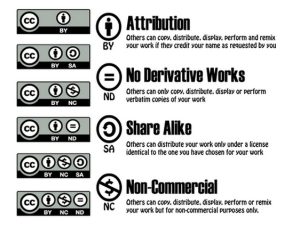2 Creative Commons Licensing
Now that you know your rights as a creator, part of working in the open deciding is if you are comfortable with openly licensing your work or not. Understanding the different rights that Creative Commons licenses grant is an important part of making the decision of whether to openly share or not.
Open Educational Resources (OER)
What you’re reading right now is an open educational resource, or an OER. It has an open license on it, specifically a Creative Commons license, which we’ll learn more about in the next section. OER are course materials created by professors, scholars, and researchers that are free for students to use. Even better, because they have open licenses, faculty and students can add to the OER, customizing it and improving it through use.
OER Defined
Open educational resources are course materials that are shared with an open license so that faculty can do the 5 R’s: revise, remix, reuse, redistribute, and retain. You can download the material, tailor it to your course, save a copy locally, and share it back out with attribution. Students can access the material for free online or in print at low cost.
Open educational resources are abbreviated as “OER.”
Common misconceptions about this term:
- OER are free – OER can be accessed for free online, but print versions will cost money to cover materials, printing, and overhead.
- OER are online – OER can be accessed in print or online (the “O” is for “Open,” not “Online”)
- OER is a recognizable term – the term “OER” is jargon and might not mean anything to students, colleagues, and administrators. Try “affordable textbooks” or “openly licensed materials” instead.
Creative Commons Licensing
Creative Commons licenses give everyone from individual creators to large institutions a standardized way to grant the public permission to use their creative work under copyright law. From the reuser’s perspective, the presence of a Creative Commons license on a copyrighted work answers the question, “What can I do with this work?” .[1]
Check out the video “Open Licensing For Student Authors” to gain more understanding on this topic.
“Open Licensing for Student Authors” is licensed under a CC BY 4.0 license by Abbey Elder.
The Creative Commons Licenses
Let’s review the 6 different license types:
Choosing a License
The six licenses and the public domain dedication tool give creators a range of options. The best way to decide which is appropriate for you is to think about why you want to share your work, and how you hope others will use that work.[2] Your instructor should be creating an environment in which you feel comfortable either enthusiastically openly licensing your work or deciding not to. You should never feel coerced into openly licensing your work.
If you decide you want to add a Creative Commons license to your work, the following flowchart can help you decide which Creative Commons license is right for you:
“Which Creative License is Right for Me?”
You can also try out the Creative Commons License Chooser, which walks you through choosing a license and provides link to the license so you can add it to your work.
Remember, the decision of choosing to openly license your work is yours and yours alone.
- Creative Commons. (n.d.). About CC licenses. Accessed September 6, 2023. https://creativecommons.org/share-your-work/cclicenses/ ↵
- Creative Commons. (n.d.). About CC licenses – Choosing a license. Accessed September 6, 2023. https://creativecommons.org/share-your-work/cclicenses/ ↵
![]()
Adapted from OER Defined by Open Oregon Educational Resources and Creative Commons Licensing from The Open Pedagogy Student Toolkit Copyright © 2023 by The Open Education Network, both licensed under a Creative Commons Attribution 4.0 International License, except where otherwise noted.


